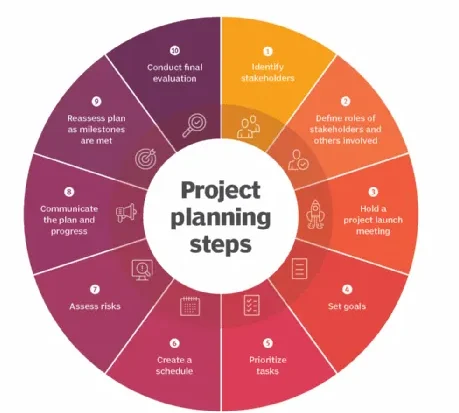The rise of the Internet of Things (IoT) has revolutionized industries, promising enhanced efficiency, improved decision-making, and innovative solutions. However, despite its potential, many IoT projects fail to deliver the expected results. Understanding the common reasons behind these failures is crucial for businesses looking to leverage IoT successfully. In this article, we will explore “Why IoT Projects Fail,” examining key pitfalls and offering practical strategies to overcome them. By addressing these challenges, businesses can increase the likelihood of achieving their IoT goals and unlocking the full potential of this transformative technology.
Common Reasons for IoT Project Failures
One of the primary reasons IoT projects fail is the lack of clear objectives. When businesses embark on IoT initiatives without well-defined goals, they struggle to measure success and align their efforts effectively. This often leads to confusion and misalignment among team members, resulting in project derailment.
Insufficient planning and budgeting also play a significant role in the failure of IoT projects. Many organizations underestimate the complexity and cost of implementing IoT solutions. Without a detailed plan and adequate budget, projects face delays, cost overruns, and scope creep, ultimately jeopardizing their success.
Technical challenges are another major hurdle. IoT projects often involve integrating various hardware, software, and connectivity components, which can be complex and fraught with compatibility issues. These technical difficulties can stall progress and require significant troubleshooting and expertise to resolve.
Data management issues further complicate IoT projects. The vast amount of data generated by IoT devices needs to be effectively collected, stored, and analyzed. Poor data management can lead to data silos, inaccuracies, and inefficiencies, undermining the value of the IoT deployment.
Security concerns are paramount in IoT projects. The interconnected nature of IoT devices makes them vulnerable to cyber-attacks and breaches. Without robust security measures, IoT projects expose organizations to significant risks, including data theft and operational disruptions.
Lastly, the lack of expertise is a critical factor in IoT project failures. Implementing and managing IoT solutions require specialized knowledge and skills. Many organizations struggle to find and retain qualified personnel, resulting in poorly executed projects and suboptimal outcomes.
Lack of Clear Objectives
Setting clear goals is crucial for the success of any IoT project. Clear objectives provide a roadmap that guides the project from inception to completion, ensuring that all stakeholders are aligned and working towards the same outcomes. Without well-defined goals, projects lack direction, making it difficult to measure progress and success.
For example, a company might launch an IoT project to “improve operational efficiency” without specifying how. This vague objective can lead to confusion among team members, misallocation of resources, and ultimately, project failure. Instead, setting specific, measurable goals such as “reduce energy consumption by 20% within six months through IoT-enabled monitoring systems” provides a clear target and a way to track progress.
Insufficient Planning and Budgeting
Detailed planning and budgeting are critical components of a successful IoT project. Proper planning involves outlining all the necessary steps, resources, and timelines required to achieve the project’s objectives. It ensures that all potential challenges are anticipated and addressed before they can impact the project. Adequate budgeting allocates sufficient funds for each phase of the project, covering everything from initial setup to ongoing maintenance.

When planning and budgeting are inadequate, IoT projects often encounter significant issues. Without a detailed plan, projects can experience delays, scope creep, and misaligned efforts. Budget shortfalls can lead to compromises in quality, incomplete implementations, and unexpected expenses, ultimately jeopardizing the project’s success. This lack of foresight can result in projects that fail to meet their goals, wasting time and resources.
By ensuring thorough planning and realistic budgeting, businesses can mitigate these risks and set a strong foundation for their IoT initiatives, enhancing their chances of success.
Technical Challenges
Technical challenges are a significant reason why IoT projects fail. Common hurdles include device interoperability, connectivity issues, and data integration. IoT ecosystems involve various hardware and software components, which often come from different manufacturers. Ensuring these components work seamlessly together can be complex and time-consuming.
To overcome these challenges, businesses should adopt standardized protocols and platforms that facilitate interoperability. Regular testing and validation of all components before deployment can identify potential issues early. Additionally, investing in robust connectivity solutions and scalable infrastructure helps maintain reliable communication and data flow, essential for the success of IoT projects.
Data Management Issues
Effective data management is crucial for the success of IoT projects. IoT devices generate vast amounts of data that need to be collected, stored, and analyzed efficiently. Poor data management can lead to data silos, inaccuracies, and inefficiencies, which can undermine the value of the IoT deployment.
For example, a company might fail to integrate data from different sources, leading to incomplete insights and missed opportunities. Another common issue is inadequate data storage solutions, resulting in data loss or accessibility problems. These failures can significantly impact decision-making and operational efficiency. Implementing robust data management practices, such as centralized data storage, real-time data processing, and regular data audits, can help mitigate these risks and enhance the overall success of IoT projects.
Security Concerns
Security challenges are a major concern in IoT projects due to the interconnected nature of devices. Common threats include unauthorized access, data breaches, and cyber-attacks, which can compromise the integrity and confidentiality of IoT systems.
To ensure robust IoT security, businesses should adopt best practices such as implementing strong authentication mechanisms, using encryption for data transmission, and regularly updating firmware to patch vulnerabilities. Additionally, continuous monitoring and employing intrusion detection systems can help identify and mitigate security threats in real-time, safeguarding the IoT ecosystem against potential attacks.
Lack of Expertise
The success of IoT projects heavily relies on skilled professionals who understand the intricacies of IoT technologies. Without the necessary expertise, businesses struggle to implement and manage IoT solutions effectively, leading to suboptimal performance and potential project failures.
To address the expertise gap, companies can invest in training programs for their existing workforce, hire specialists with IoT experience, or collaborate with external consultants. Leveraging IoT platforms and tools that offer user-friendly interfaces and robust support can also help bridge the knowledge gap, ensuring smoother implementation and management of IoT projects.
How to Avoid These Pitfalls
Ensuring the success of IoT projects requires a strategic and holistic approach. One of the first steps is setting clear objectives. Without well-defined goals, projects can quickly lose direction, leading to confusion and misalignment among team members. Specific, measurable objectives provide a roadmap that guides the project from inception to completion, making it easier to track progress and make necessary adjustments along the way.
Thorough planning and realistic budgeting are equally crucial. Many IoT projects fail due to inadequate planning and underestimated costs. Detailed planning involves outlining all necessary steps, identifying potential challenges, and allocating resources efficiently. Proper budgeting ensures that there are sufficient funds for each phase of the project, including unexpected expenses, which helps prevent delays and compromises in quality.
Technical challenges are another common hurdle. IoT projects often involve integrating various hardware, software, and connectivity components, which can be complex and prone to compatibility issues. Adopting standardized protocols and platforms can facilitate interoperability, while regular testing and validation of all components can help identify and resolve issues early. Investing in robust connectivity solutions and scalable infrastructure ensures reliable communication and data flow, which is essential for the success of IoT projects.
Effective data management is critical in IoT deployments. Poor data management can lead to data silos, inaccuracies, and inefficiencies, undermining the value of the IoT deployment. Implementing centralized data storage solutions and real-time data processing can prevent these issues. Regular data audits ensure that the data remains accurate and efficient, allowing for meaningful insights that can drive better decision-making.
Security concerns are paramount in IoT projects due to the interconnected nature of devices. Adopting strong authentication mechanisms, using encryption for data transmission, and regularly updating firmware to patch vulnerabilities are essential practices. Continuous monitoring and intrusion detection systems can help identify and mitigate security threats in real-time, safeguarding the IoT ecosystem against potential attacks.
The lack of expertise can also hinder IoT projects. Implementing and managing IoT solutions require specialized knowledge and skills. Investing in training programs for existing staff, hiring specialists with IoT experience, and collaborating with external consultants can bridge the expertise gap. Leveraging IoT platforms and tools that offer user-friendly interfaces and robust support can also ease the implementation and management process.
Continuous monitoring and adaptation are vital for the ongoing success of IoT projects. IoT environments are dynamic, and ongoing monitoring ensures that projects remain aligned with their objectives and can adapt to new challenges. Implementing systems for continuous performance tracking and regular reviews allows businesses to make data-driven decisions and adjust strategies as needed. This proactive approach helps maintain operational efficiency and ensures that the IoT deployment continues to deliver value.
By addressing these common pitfalls with strategic planning, robust technical solutions, effective data management, strong security measures, and continuous adaptation, businesses can enhance the likelihood of success in their IoT projects.
—
Do you have questions about an IoT project? Speak with one of our experts today to learn how Wagtel can help to deploy, scale, and secure your IoT project.






